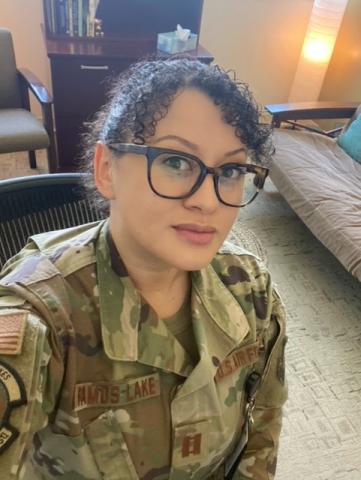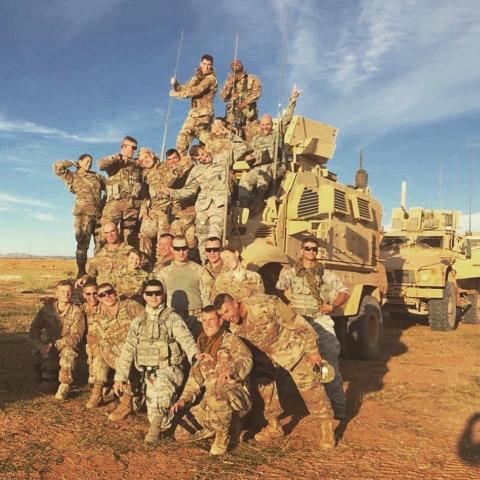LaTosha Ramos
MAFP, PsyD
LaTosha Ramos remembers studying in the GSPP clinic when she got the call, “We’re sending a team overseas and we need you to lead it. We deploy in six months.” In a single moment, her focus on finishing out the final year of her PsyD program, securing an internship, and studying for classes dramatically shifted to the upcoming mission and sacrifices on deck. LaTosha’s (clinical) supervisor asked how she felt, subtly inquiring if there was a way out of the mission. As LaTosha put it, “In my mind, there wasn’t an option to say no because, I have troops going over there. If they’re going, then I’m going – that’s it.” As planned, LaTosha halted her PsyD program at GSPP and deployed in 2017, leading two flights and over 150 people to accomplish a mission in the middle east. Little did she know, the decision to deploy on this mission would have a profound impact on her career trajectory, relationship with herself, and purpose in life.
Today, Capt. LaTosha Ramos serves as the Mental Health Element Chief at Tinker Air Force Base in Oklahoma. She is responsible for the mental health clinical operations at the base, serving a population of 8,000-10,000 active-duty Air Force, Navy, Army guard, and reserve members. Her team consists of 14 professionals that range from psychologists and psychiatrists to social workers and mental health technicians. Her rank as Captain requires her to combine a degree of administrative work with her clinical responsibilities, as she is a fully functioning clinician. The 8,000:14 ratio is demanding, but Ramos and her team strive to make small miracles happen by promoting resiliency, keeping individuals ‘in the game’ and taking care of those who are unable to continue meeting the immense expectations of the job. Although the active duty military population is generally healthy due to various vetting and screening processes, the nature of their jobs are demanding and heavy. Individuals are asked to be separated from their families, go overseas, do and see unthinkably terrible things and ultimately, be in the business of war. The Mental Health Element team helps active duty personnel navigate and cope with things like depression, anxiety, bipolar, psychosis, anxiety and suicide.
Capt. Ramos explains that “suicide in the military is a problem” and two general key risk factors for suicide, thwarted belongingness and
perceived burdensomeness as defined by Joiner (2009), weigh especially heavily on military personnel. Burdensomeness, the belief that one is so inadequate that one's existence is a burden on friends, family members and/or society, can hit hard for military personnel because from day one in basic training, “we are trained to be very interdependent, to depend on one another as a team. We don’t want to be the slowest person on a ruck or the person everybody is trying to help. We want to carry our own weight, contribute and be part of the team. So, when there are times we feel we aren’t doing that within our family, within our workspace, or at school as a student– that burdensomeness, we feel that hard core.”
Similarly, thwarted belongingness, a psychologically painful mental state that results when the fundamental need for connectedness is unmet, can resonate all too familiar for military personnel. “We function as part of a team. We have battle buddies, wingmen –the people we literally live and die for” Ramos explains. “So, when we feel like we don’t belong, for example, in a graduate student setting, in the civilian world, or within our family after coming home from overseas, we feel that thwarted belongingness deeply because we come from a collectivist culture.” These aspects of military training and culture make military personnel at higher risk to experience thwarted belongingness and burdensomeness, which can lead to suicide or other mental ill-health conditions.
Demonstrating Determination
To illustrate Ramos’ journey thus far, we must go back to her undergraduate experience at the University of Kansas. As a first-generation college student, she saw joining the military as a way to pay for college. In her time at Kansas, she worked various jobs, one of which was as a death investigator. By the time she graduated, her experience in military, law enforcement, and forensic work led her to the MA Forensic Psychology (MAFP) degree at GSPP. While she gained a lot in the program, she yearned to continue learning about herself as a clinician and about therapy. Upon graduating from MAFP, she continued on to the PsyD program at GSPP. Throughout her time in the department, Ramos describes the slow unpacking of two very different identities of herself. As she navigated life as a member of the military and a as a grad student, she found that the two identities would often be at odds. “I often felt like I had to be one or the other,” she recalls.
During her six years and two degrees at GSPP, she began to unpack this mutually exclusive relationship she once held of her two primary identities: military member and graduate student. It wasn't until that '17-'18 deployment during the middle of her PsyD program where she recognized firsthand that the unification of these two identities could be useful for the way she led her troops. Amidst the mission at hand while on deployment, individuals in her unit were also facing major life stressors like grief loss, divorce and other things. Ramos reflects, "I was well equipped for that this time, as opposed to previous deployments."
She explains how GSPP helped her grow and prepare to lead during such a chaotic, high stakes and emotionally turbulent time. "The things I was learning about being a therapist at GSPP - facilitating change, managing conflict, and navigating identities - were actually making me a better supervisor and security forces team member." The rich knowledge she was acquiring in the classroom was applied in a highly relevant and timely way that aided in the improved functioning of her entire unit during the deployment.
In thinking about one of her most proud professional moments, the unexpected arrival at her current role and purpose is at the top of the list. Ramos details that she never actually saw herself becoming a military clinician. She explains the stigma issues back then about getting mental health help in the military. "I was of an older (military) mindset, which was 'you don't go to mental health; you stay away, you don't want to be viewed that way' and I shared that same mindset. I didn't want to go to mental health because of the career impact it might have." During the '17-'18 deployment, the serious issues she witnessed her unit struggle with moved her to refer them to get mental health help. She wanted them to fight the stigma and get the care they needed.
The only psychologist on base at the time, Lt. Col. Roa-Navarrete, personally saw to the health of Ramos' troops. As a supervisor, Ramos was pleased with the good things members of her team had to say about the care they received from Dr. Roa-Navarrete. Upon eventually connecting with Dr. Roa-Navarrete, Ramos sought her guidance on becoming a psychologist in the military. As it turned out, in addition to being the temporary psychologist on base during that deployment, Dr. Roa-Navarrete was also the clinical director of the residency program at Wright Patterson Air Force Base. Over the course of their relationship, Dr. Roa-Navarrette helped Ramos break down prejudices about mental health in the military and get a better understanding about career opportunities in military mental health. Ramos says, "She made me think I could do this. So, I got back from deployment and finished out my last year at GSPP. I Applied for Dr. Roa-Navarrete's program at Wright Patterson AFB, interviewed, and ended up matching there. I got to learn from the same psychologist that took such good care of my troops when we were deployed." The poetic nature of these circumstances helped Ramos realize that indeed, this is the works she was meant to do. "I felt like I could finally blend these two identities completely and be both a psychologist and in the military, and do the thing I've always wanted to do which was be there for my troops."
In light of Veteran's Day, Ramos highlighted how veteran inclusion effort can be improved and shared some encouraging words for all veterans out there. The importance of the two-way nature of his conversation is crucial to enhancing inclusive work with a veteran lens. She explains that the transition from active duty to veteran status is an immense identity shift. "We go from having intense responsibility, rules around how to dress and groom ourselves, a very like-minded community around us at all times, to being overwhelmed with complete autonomy and liberty in the civilian world," she points out. In her doctoral research paper, "From Combat to Clinical Work: Exploring Veteran Experiences Transitioning from the Military to the Practice of Psychology", Ramos dives into the themes that emerged in her research among veterans.
To civilians, Ramos says:
- Don't stereotype - any image of veterans you have in your head, go ahead and get rid of it. View people as individuals; first and foremost, veterans are human beings.
- Take into consideration that there will be differences between civilians and veterans.
- Take the time and effort to understand and include veterans; persistence can be key.
To vets, Ramos encourages you to:
- Be willing to experience the discomfort of building relationships with non-veterans to avoid feeling isolated.
- Acknowledge and challenge the barriers you may put up towards others without military experience.
To learn more about Capt. Ramos' doctoral research paper, you can check it out here.
As Capt. Ramos thinks about imparting wisdom or advice for younger generations, a few things stand out to her:
- Soak up every bit of supervision while you can because you won't always have it.
- Be willing to fail and don't be afraid to be wrong
- Do the hard things; have the hard conversations
- Ask questions and seek feedback






